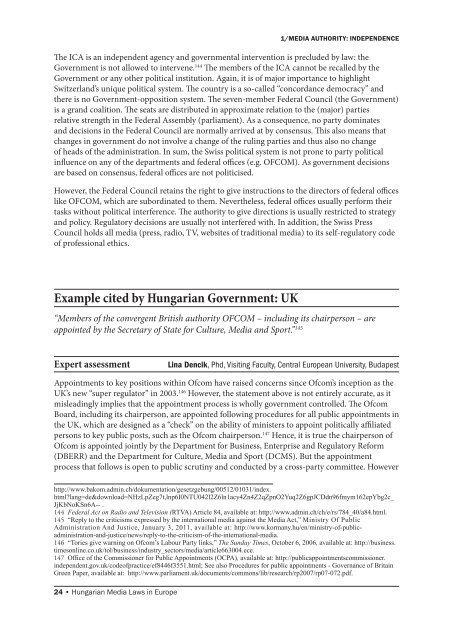An Assessment of the Consistency of Hungary's Media Laws with ...
An Assessment of the Consistency of Hungary's Media Laws with ...
An Assessment of the Consistency of Hungary's Media Laws with ...
You also want an ePaper? Increase the reach of your titles
YUMPU automatically turns print PDFs into web optimized ePapers that Google loves.
24 • Hungarian <strong>Media</strong> <strong>Laws</strong> in Europe<br />
1/<strong>Media</strong> authority: independence<br />
The ICA is an independent agency and governmental intervention is precluded by law: <strong>the</strong><br />
Government is not allowed to intervene. 144 The members <strong>of</strong> <strong>the</strong> ICA cannot be recalled by <strong>the</strong><br />
Government or any o<strong>the</strong>r political institution. Again, it is <strong>of</strong> major importance to highlight<br />
Switzerland’s unique political system. The country is a so-called “concordance democracy” and<br />
<strong>the</strong>re is no Government-opposition system. The seven-member Federal Council (<strong>the</strong> Government)<br />
is a grand coalition. The seats are distributed in approximate relation to <strong>the</strong> (major) parties<br />
relative strength in <strong>the</strong> Federal Assembly (parliament). As a consequence, no party dominates<br />
and decisions in <strong>the</strong> Federal Council are normally arrived at by consensus. This also means that<br />
changes in government do not involve a change <strong>of</strong> <strong>the</strong> ruling parties and thus also no change<br />
<strong>of</strong> heads <strong>of</strong> <strong>the</strong> administration. In sum, <strong>the</strong> Swiss political system is not prone to party political<br />
influence on any <strong>of</strong> <strong>the</strong> departments and federal <strong>of</strong>fices (e.g. OFCOM). As government decisions<br />
are based on consensus, federal <strong>of</strong>fices are not politicised.<br />
However, <strong>the</strong> Federal Council retains <strong>the</strong> right to give instructions to <strong>the</strong> directors <strong>of</strong> federal <strong>of</strong>fices<br />
like OFCOM, which are subordinated to <strong>the</strong>m. Never<strong>the</strong>less, federal <strong>of</strong>fices usually perform <strong>the</strong>ir<br />
tasks <strong>with</strong>out political interference. The authority to give directions is usually restricted to strategy<br />
and policy. Regulatory decisions are usually not interfered <strong>with</strong>. In addition, <strong>the</strong> Swiss Press<br />
Council holds all media (press, radio, TV, websites <strong>of</strong> traditional media) to its self-regulatory code<br />
<strong>of</strong> pr<strong>of</strong>essional ethics.<br />
Example cited by Hungarian Government: UK<br />
“Members <strong>of</strong> <strong>the</strong> convergent British authority OFCOM – including its chairperson – are<br />
appointed by <strong>the</strong> Secretary <strong>of</strong> State for Culture, <strong>Media</strong> and Sport.” 145<br />
Expert assessment Lina Dencik, Phd, Visiting Faculty, Central European University, Budapest<br />
Appointments to key positions <strong>with</strong>in Ofcom have raised concerns since Ofcom’s inception as <strong>the</strong><br />
UK’s new “super regulator” in 2003. 146 However, <strong>the</strong> statement above is not entirely accurate, as it<br />
misleadingly implies that <strong>the</strong> appointment process is wholly government controlled. The Ofcom<br />
Board, including its chairperson, are appointed following procedures for all public appointments in<br />
<strong>the</strong> UK, which are designed as a “check” on <strong>the</strong> ability <strong>of</strong> ministers to appoint politically affiliated<br />
persons to key public posts, such as <strong>the</strong> Ofcom chairperson. 147 Hence, it is true <strong>the</strong> chairperson <strong>of</strong><br />
Ofcom is appointed jointly by <strong>the</strong> Department for Business, Enterprise and Regulatory Reform<br />
(DBERR) and <strong>the</strong> Department for Culture, <strong>Media</strong> and Sport (DCMS). But <strong>the</strong> appointment<br />
process that follows is open to public scrutiny and conducted by a cross-party committee. However<br />
http://www.bakom.admin.ch/dokumentation/gesetzgebung/00512/01031/index.<br />
html?lang=de&download=NHzLpZeg7t,lnp6I0NTU042l2Z6ln1acy4Zn4Z2qZpnO2Yuq2Z6gpJCDdn96fmym162epYbg2c_<br />
JjKbNoKSn6A-- .<br />
144 Federal Act on Radio and Television (RTVA) Article 84, available at: http://www.admin.ch/ch/e/rs/784_40/a84.html.<br />
145 “Reply to <strong>the</strong> criticisms expressed by <strong>the</strong> international media against <strong>the</strong> <strong>Media</strong> Act,” Ministry Of Public<br />
Administration <strong>An</strong>d Justice, January 3, 2011, available at: http://www.kormany.hu/en/ministry-<strong>of</strong>-publicadministration-and-justice/news/reply-to-<strong>the</strong>-criticism-<strong>of</strong>-<strong>the</strong>-international-media.<br />
146 “Tories give warning on Ofcom’s Labour Party links,” The Sunday Times, October 6, 2006, available at: http://business.<br />
timesonline.co.uk/tol/business/industry_sectors/media/article663004.ece.<br />
147 Office <strong>of</strong> <strong>the</strong> Commissioner for Public Appointments (OCPA), available at: http://publicappointmentscommissioner.<br />
independent.gov.uk/code<strong>of</strong>practice/ef8446f3551.html; See also Procedures for public appointments - Governance <strong>of</strong> Britain<br />
Green Paper, available at: http://www.parliament.uk/documents/commons/lib/research/rp2007/rp07-072.pdf.

















